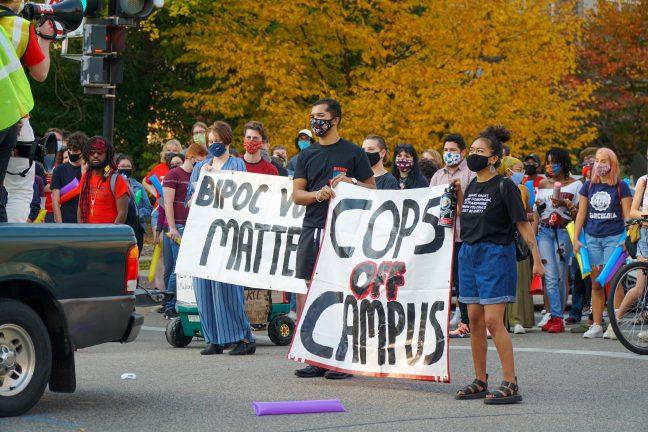In late September, ASM passed a vote of no confidence in the University of Wisconsin Police Department. The vote followed a summer of protests in conjunction with the Black Lives Matter movement and mass student advocacy for a change in the relationship with the UWPD.
Following the killing of George Floyd, protests erupted in several cities across the U.S., including Madison. With thousands gathered at the Wisconsin State Capitol to support the Black Lives Matter movement, the Madison Police Department requested assistance from UWPD. In response, UWPD and MPD deployed two riot teams to control the crowd.
ASM Shared Governance Chair Katie McGlasson shared her experiences from the protests.
“I was present that last weekend of May right after the murder of George Floyd,” McGlasson said. “[I] was tear-gassed a number of times over the course of that weekend.”
According to multiple participants of the protests, the riot teams applied tear gas and pepper spray. After students raised concerns regarding the use of tear gas, UWPD persistently claimed they only provided pepper spray, though a report from UWPD released Oct. 16 shows they spent upwards of $6,500 on various items, including pepper spray, smoke grenades and more.
Co-founder of UW’s BIPOC Coalition Juliana Bennett said she was troubled by what she considers a close-knit relationship between UWPD and MPD.
“We like to think of UWPD and MPD as two separate entities when they are not,” Bennett said. “Just knowing they work together, I don’t feel safe.”
A group of 29 students signed up to speak regarding the vote of no confidence at ASM’s Student Council open forum. The final vote on the issue was 9-5.
According to ASM’s press release, the vote signifies a lack of confidence and trust in the UWPD due to their presence at the protests off campus, failure to comply with the #8cantwait standards and unwillingness to meet all or most of the reforms requested by ASM leaders and students.
“I’m hoping it will act as a call to action rather than a simple condemnation,” McGlasson said. “There’s a lot of work that’s required to make sure the vote is not just a symbolic action and it inspires the necessary steps to make students feel safer on campus.”
In calling the vote a symbolic action, McGlasson said there will be no instantaneous change. The vote of no confidence signals to university leadership and UWPD that students want the relationship between campus police and students to change — but, this will require time.
McGlasson also said she is sure the vote does not reflect all student voices, but regardless, shows a strong signal of solidarity for students who have had negative experiences with UWPD.
“We can start investigating the UWPD,” Bennett said. “All investigations are carried out internally. They have hidden $10,000 that they’ve used to buy tear gas that they used on their own students.”
Bennett said the actions of UWPD are shameful and she wants to use the vote to invite everybody to change.
In contrast, UWPD Chief Kristen Roman said she was disheartened by ASM’s vote in an official statement.
“On behalf of the UWPD I say with the utmost confidence that we can be trusted,” Roman said in the statement. “I am disappointed. Not in the questions themselves, but for not being given the opportunity to engage in a full process prior to this vote.”
ASM held the vote of no confidence approximately one month following the start of the semester. The vote was introduced earlier on Sept. 24.
UW Chancellor Rebecca Blank expressed similar sentiments to those of Roman.
“There’s not been a series of conversations between ASM representatives and UWPD,” Blank said. “There’s been maybe one conversation that’s taken place, and you would think a vote of no confidence would occur after a series of conversations when people felt they weren’t being listened to, or, you know, their issues were not being addressed.”
Bennett said Blank refused to have meetings with BIPOC voices and that Blank cannot work toward racial equity and inclusion without including the BIPOC Coalition in meetings.
While Roman and Blank viewed the vote as premature, ASM Grant Allocation Chair Samuel Jorudd deemed the verdict long overdue. In fact, Jorudd initiated the vote of no confidence.
“We have given a voice to those who have fought too long to be heard,” Jorudd said.
The BIPOC Coalition created an Instagram page for BIPOC students to anonymously share their negative experiences at UW, with over 200 accounts published. The BIPOC Coalition developed a campaign titled Get Cops Off Campus, designed to voice students’ feelings of danger with police presence.
‘#mixedmessages:’ UWPD, ASM Chair clash on Twitter over defunding the police
Blank said she disagrees with the calls to remove campus police.
“There’s 65,000 people on campus. When everyone is here, we’re bigger than the town of Janesville,” Blank said. “Like any complex community of that sort, we have issues of crime, we have issues of sexual assault, we have issues that need a security force.”
McGlasson said the stark contrast in opinion seen between student council and administration regarding UWPD is uncommon and could, understandably, cause future tensions. She hopes the difference in opinions does not stop conversations concerning campus policing and student safety.
Currently, Blank, Roman and ASM are committed to working together to build a better relationship.
“If anything, I think the vote and response are a good opportunity for the chancellor and other administrators to maybe realize the gravity of the concerns of some of their students,” McGlasson said.


